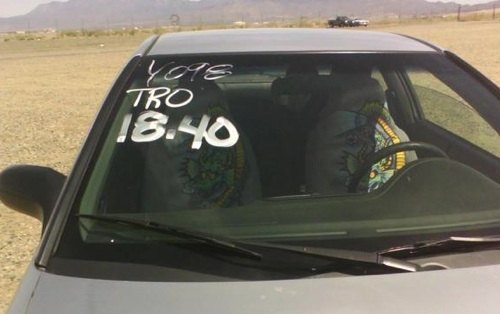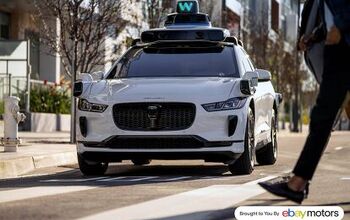Hammer Time: The $2 Bet
Let’s assume you do about 5000 miles of commuting a year. It’s a typical miserable commute. But the job is great and come hell or deficit spending, you’ll be there as long as you like. While daydreaming about those glorious TPS reports you get to write every day, there’s a knock on your door. The fellow down the street who you’ve known since Clinton was enjoying his office has an offer you. “If you pay me $20 a week to help me with gas, I’ll drop you off at work and pick you up every day until 2020.” Your friend also offers you his car for those times when he’s on vacation, and should he move, die, or become another OJ, you get his car free and clear. The spouse overhears the conversation and exclaims, “This is great! We can sell the car and become a one car family!” You don’t care because like most employees of Dunder Mifflin, cars mean nothing but transportation to you. Your life revolves around the office. Here’s the question:
Is it worth it? We’re talking strictly from a financial perspective. Those who are spreadsheet savvy may crunch the numbers while the other 90+% can simply swag it. Your late granny’s church car, a Honda Civic HX, cost you only $1000 (she liked you a lot) and in 2020 you can likely sell it for $700. It gets you 35 mpg for the commute. Insurance will likely average $400 a year (rural America), repairs will be $300, inflation is five percent, average gas price is $3, and you can sell the car today for $2500 and invest the money in a money market that will average five percent. Do not share your answers until all pencils are down and no peaking [sic].
More by Steven Lang


































Comments
Join the conversation
only 5,000 miles of commuting a year? wow, i'm jealous
Tosh is on to something there on the value of freeing up time. Assuming you can read, play with you laptop, iPhone or whatever this time has value. When I was a full time student and part time bureaucrat in Sacramento I was happy to take light rail even though it added roughly an 45min/day to my total commute versus just taking my car downtown. That was 45min that I could use for reading & homework rather than the aggravation of congested urban freeway driving. Economically it was a slam dunk, as my heavily subsidized light rail pass was $25/month vs fuel cost of $90/month.
A lot of great answers. Even though this question has a mathematical foundation, it's really the questions of your lifestyle and preferences that determine your decision. Do you still value having your own ride during commuting times? Do you fear not having access to transportation during the day? Do you hate maintaining a car that you only really use for an unjoyful commute? Do you trust 'the other guy' in this equation? The answers are like waves. No two people will have the same exact level of priorities which makes the answer far more interesting than simple number's crunching. One other thing. This scenario is very much rooted in reality for yours truly. Back in 2003 I considered working for a company that is only nine miles away from home. There are plenty of folks in my street who drive through the same route during the week and it's just a downright lousy drive. In the present day, auctioneers and dealers will often combine together for rides if we have to go through more than one sale during the day. If I hadn't been sick this afternoon I would have driven my Insight up to north Georgia with a wholesaler I've known for about 10 years now. It's usual to pay for dinner or gas given that you effectively save time and/or a tow of a purchased vehicle for that person. Anyhow, the numbers. Here's what you have to work with. Purchase Cost 1000 Ten Years Sell for $700 Miles 5000 Annual Gas Cost ($3/Gallon) $428.57 (average) Insurance $400 (average) Repairs $300 (average) Opportunity Cost $2500 now $1570 from not investing the $2500 given a 5% return (nominal) Round-Trip Commute 20.8 miles In my initial draft I thought I had put down $50 for fees (registration and possible emissions) but state fees are a wildly variant figure and it wouldn't change the final outcome. For the sake of simple numbers crunching I left out an inflation rate of 5%. If I had it would have made everything impossible for those who don't have a financial background. Those who do would have used NPV anyhow. Assuming these parameters, you end up with approimately $12,000 (it depends if you adjust gas, repairs and insurance for inflation and whether you apply opportunity cost for those expenses) vs. approximately $8500 depending on whether you start to carpool now vs. a later time and how much vacation time you enjoy at Dunder Mifflin. The big point is this. If you're established in what you do and hate your commute, try to avoid owning a second car. Even up to the early 1990's a third of families only had one vehicle. The expectation of having a second vehicle is a fairly recent one and unless you have a real cheap clunker that you work on yourself, the economics simply don't make sense. The little point is opportunity cost. For a lot of 'non-enthusiast' folks, the opportunity cost of having a second car over their lifetime is well into the six figures. In the future you may even end up spending less on gas than the cost of not investing that money. As a frugal fellow who hates commuting in a metro area, it would pay to not have to divest your money into car ownership if you can help it. One other sidenote for those who love cars. Even if the commute sucks If you're a trader and can make money with your commuter, it makes money to keep it. If you have your own business, so much the better. For those who took that into consideration, congrats. You're even sharper than I was when creating this whole mess.